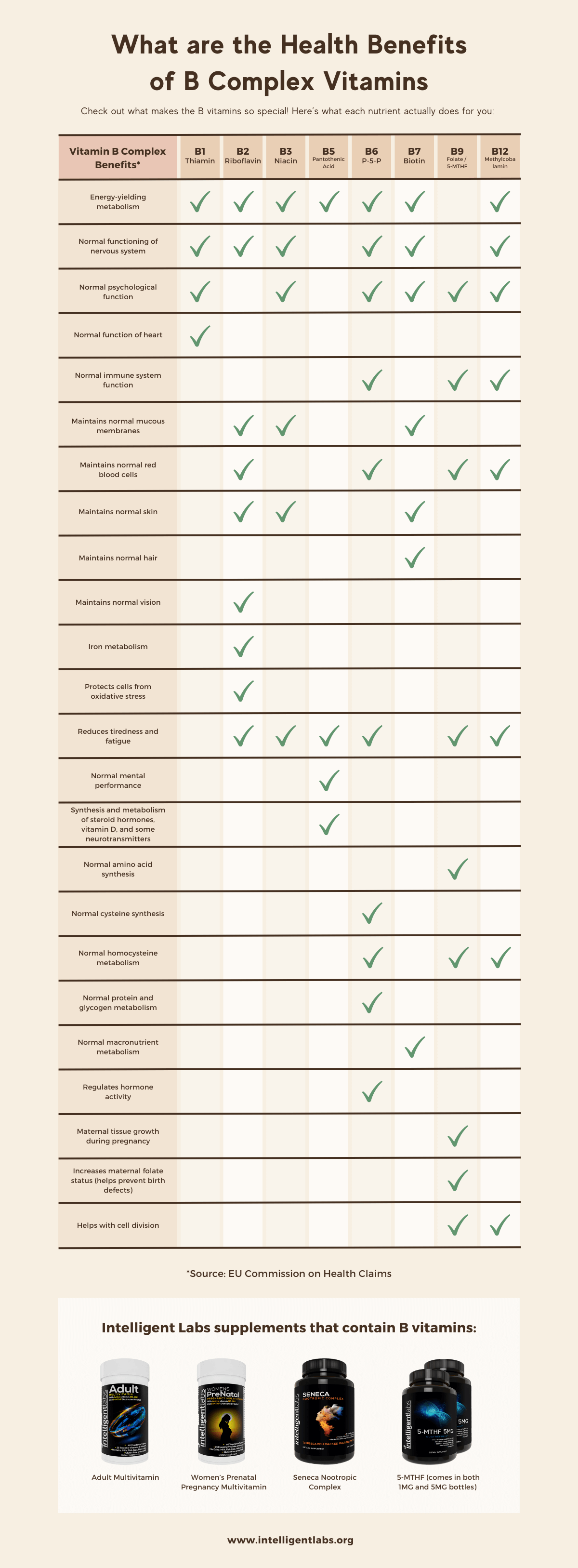Did you know that out of 13 essential vitamins, 8 of them belong to the vitamin B complex? But what exactly makes this vitamin group so special? Let’s find out below as we discuss the numerous vitamin B complex benefits, where to get them, how much to take per day, and more! Also, we’ll introduce you to the Intelligent Labs supplements that feature these B vitamins, such as our 5-MTHF Activated Folic Acid.
Table of Contents
What are the different B vitamins?
The B vitamins are a group of nutrients that contribute to our overall health and wellness in many ways. They are often found together in the same foods, e.g. many fruits and veggies contain more than one type of B vitamin.
B vitamins are considered essential and aren’t produced in the body. This means we must take them from external sources, such as whole foods, fortified foods, or dietary supplements.
Here are the 8 nutrients that make up the B complex:
- Vitamin B1 – Thiamin
- B2 – Riboflavin
- B3 – Niacin
- B5 – Pantothenic Acid
- B6 – Pyridoxine
- B7 – Biotin
- B9 – Folate
- B12 – Cobalamin
Why are there gaps in the numbers? What happened to the rest of the B vitamins?
There were initially twelve B complex vitamins (from B1 to B12). However, four of them had to be removed from the official list because they were either readily made by the body or not considered essential for our health. These four former B vitamins are:
- Vitamin B4 – Choline or Adenine
- B8 – Inositol
- B10 – Para Amino Benzoic Acid or PABA
- B11 – Salicylic Acid
What are the health benefits of B complex vitamins?
As a whole, B vitamins work together to support optimal wellness. They contribute in various ways to the healthy functioning of our immune, nervous, muscular, cardiovascular systems, and more.
Vitamin B complex benefits include reducing tiredness and fatigue and boosting energy levels. They’re vital to our physical development and performance, and overall well-being.
Some B vitamins have more specific functions, such as vitamin B9’s critical role in fertility, pregnancy, and birth defect prevention. Check out this article on why 5-MTHF activated folic acid (vitamin B9) is best for prenatal health.
The infographic below summarizes the different health benefits of each B vitamin.

Does vitamin B complex help improve memory and support mental health?
Several B vitamins contribute to optimal brain and mental health, including memory support.
Does vitamin B help with fatigue, stress, and anxiety?
In addition to their mental health benefits, B vitamins also help fight fatigue, stress, and anxiety. They help reduce tiredness and convert the food we eat into energy. Rightly so, these B vitamins are also known as natural energy boosters!
Where can you find the B complex vitamins?
Some vitamins need not be taken daily; these are the fat-soluble vitamins that get stored in the human body. However, water-soluble vitamins (like the entire lineup of B vitamins) aren’t stored, so daily intake is necessary. There are 3 sources of B complex vitamins:
- Whole foods
- Fortified foods
- Dietary supplements
Source #1 – Whole Foods
The best sources of B complex are fruits and veggies, nuts and seeds, meat, organ meat, seafoods, and other whole foods. Eating various nutrient-rich foods from different food groups helps ensure your body gets all the vitamins and minerals it needs to function properly!
Source #2 – Fortified Food Products
Fortified food products are another excellent source of B vitamins. Examples are cereals, flour, bread, grains, milk, dairy products, juices, and baby food. In many countries, certain foods are legally required to be fortified with different nutrients, including B vitamins.
Source #3 – Dietary Supplements
Lastly, dietary supplements are another excellent source of B complex vitamins. They help fill gaps in the diet. If you’re not eating healthy all the time, it’s a good idea to take supplements to ensure your B vitamin needs are covered.
You can purchase individual B vitamins, e.g. only vitamin B1, only vitamin B2, only folic acid (we recommend the active 5-MTHF form vs. regular folic acid), and so on.
What’s the recommended daily intake (RDI) for the different B vitamins?
Here’s a table outlining the daily recommendations per B vitamin for men and women aged 19+ (second and third column). The fourth column is for pregnant and lactating women.
The fifth column is for the tolerable upper intake level (UL); this is the maximum daily dose without adverse effects. ‘Not established’ means that a toxic level has not been observed, even at very high doses.
| B Vitamin | Men | Women | Pregnant / Lactating Women | Tolerable Upper Intake Level |
| B1 | 1.2mg | 1.1mg | 1.4mg / 1.4mg | Not established |
| B2 | 1.3mg | 1.1mg | 1.4mg / 1.5mg | Not established |
| B3 | 16mg NE | 14mg NE | 18mg NE / 17mg NE | 35mg NE for all adults |
| B5 | 5 mg | 5mg | 6mg / 7mg | Not established |
| B6 | 1.3mg (14-50) / 1.7mg (51+) | 1.3mg (19-50) / 1.5mg (51+) | 1.9mg / 2mg | 100mg for all adults |
| B7 | 30mcg | 30 mcg | 30mcg / 35mcg | Not established |
| B9 Folate | 400mcg DFE | 400mcg DFE | 600mcg DFE / 500mcg DFE | 1,000mcg folic acid from non-food sources |
| B12 | 2.4mcg | 2.4mcg | 2.6mcg / 2.8mcg | Not established |
Notes:
For B3, NE refers to niacin equivalents. 1mg NE = 1mg of niacin or 60mg of tryptophan.
For B9 Folate, DFE refers to dietary folate requirements. 1mcg DFE = 1mcg food folate = 0.6mcg folic acid from non-food sources.
What are the signs of vitamin B deficiency?
If you’re not taking enough of these vitamins, then you’re also not getting the many vitamin B complex benefits.
While B complex deficiencies are rare nowadays, it’s still possible to be deficient. People who drink excessive amounts of alcohol and those who suffer from malabsorption disorders are at risk. Likewise, those with health issues, such as advanced kidney disease, rheumatoid arthritis, and pernicious anemia, are also at risk (1, 2).
Many vitamin B deficiency symptoms are similar to other nutrient deficiencies and health issues. For example, nausea, sleep problems, numbness, headaches, fatigue, weakness, lack of focus, light-headedness, irritability, weight loss, and more.
That said, here are the more severe symptoms of prolonged deficiency:
- B1 – beriberi or Wernicke’s encephalopathy
- B2 – peripheral neuropathy, skin disorders, iron-deficiency anemia, mouth ulcers
- B3 – pellagra, a condition characterized by the 3Ds (dermatitis, diarrhea, dementia)
- B5 – hypoglycemia, depression, upper respiratory infections
- B6 – microcytic anemia (red blood cells are abnormally small), skin problems, confusion, depression
- B7 – alopecia, depression, hallucinations, seizures, scaly skin
- B9 and B12 – most symptoms are typically the same between B9 and B12. They include megaloblastic anemia (red blood cells are abnormally large), birth defects in offspring, extreme fatigue, cardiovascular disease, and psychological and mental health problems.
The good news is that increasing your B vitamin intake via diet or supplementation can successfully reverse the symptoms and set you back to good health!
Conclusion
The human body cannot survive without vitamins and minerals, including the entire list of B vitamins. Because they’re water-soluble, getting your daily dose of B vitamins is important. Food is the ideal source, of course, but supplementation can also help you take advantage of the numerous vitamin B complex benefits.
💬 Something on your mind? Share your thoughts in the comments. We love hearing from curious minds.
📩 And while you’re here, join our newsletter for more smart stuff (and secret perks)!
References
(1) B Vitamins: Functions and Uses in Medicine, Mary Hanna et al. Published Online: June 17, 2022
(2) Symptoms of Vitamin B Deficiencies, Medically reviewed by Madeline Knott, MD — By David Heitz




